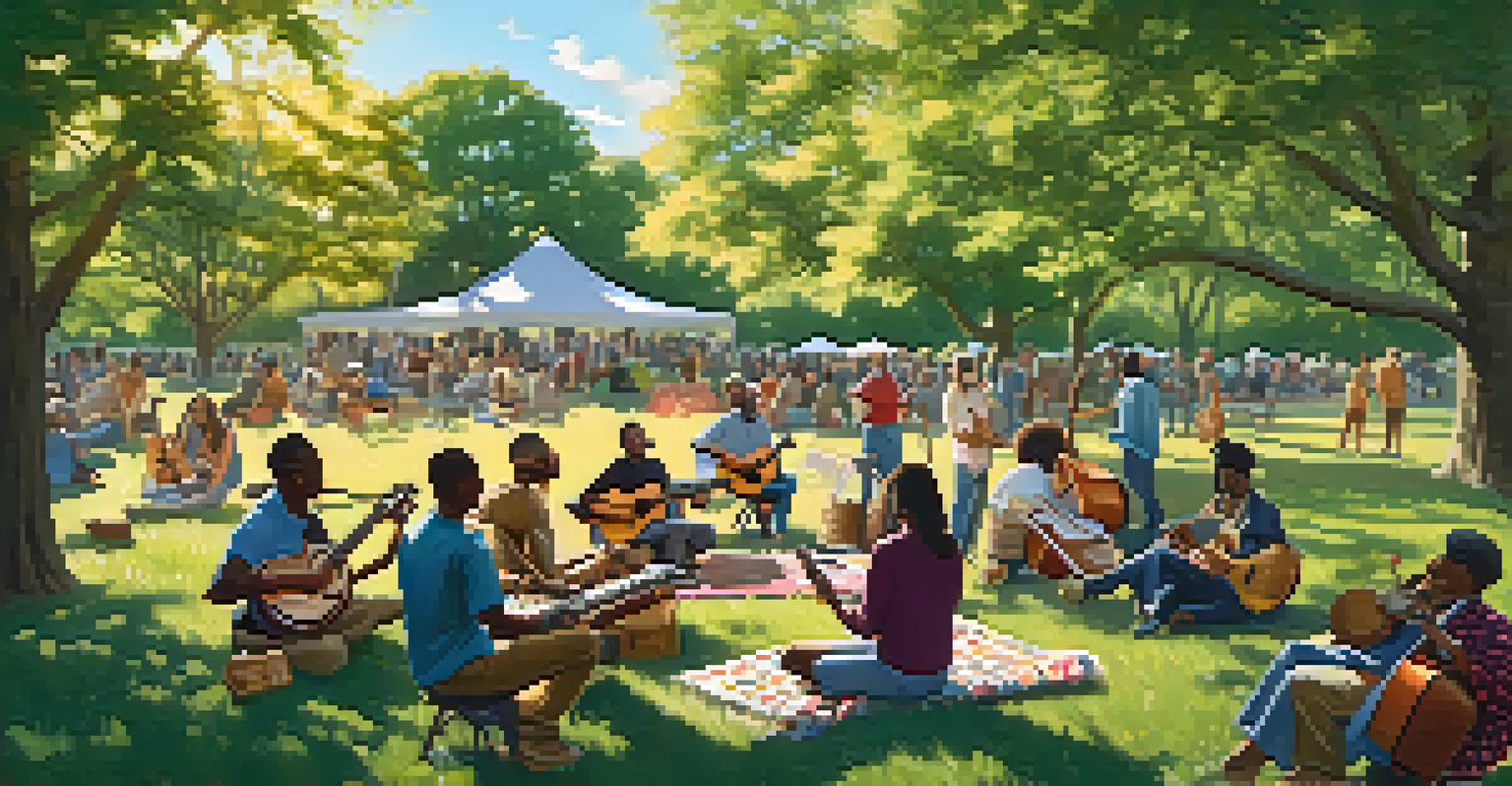Collaborating with Other Musicians: A Guide for Guitarists

Understanding the Benefits of Collaboration for Guitarists
Collaboration can be a game-changer for guitarists. It opens doors to new ideas, styles, and techniques that can enhance your playing. By working with others, you can learn how to blend your guitar skills with different genres, creating a richer musical experience.
Alone we can do so little; together we can do so much.
Moreover, collaboration can help you build valuable connections within the music community. These relationships often lead to more opportunities, whether it’s gigs, recording sessions, or songwriting partnerships. When you collaborate, you’re not just playing music; you’re also networking.
Lastly, working with other musicians can boost your creativity. Sometimes, stepping outside your comfort zone and trying something new can spark inspiration. A fresh perspective might be exactly what you need to take your music to the next level.
Finding the Right Musicians to Collaborate With
Choosing the right collaborators is crucial for a successful partnership. Look for musicians whose styles complement your own, whether they play different instruments or share similar influences. This balance can create a harmonious blend of sounds that enhances the final product.

Consider reaching out to local music schools, open mic nights, or online platforms to discover potential collaborators. Social media can also be a powerful tool for finding like-minded musicians. Share your goals and interests to attract those who resonate with your vision.
Collaboration Enhances Creativity
Working with other musicians can spark new ideas and techniques, enriching your musical experience.
Don’t forget to trust your instincts. If you feel a connection with a musician during your first interaction, it’s likely that you’ll work well together. Chemistry is key in collaboration, so prioritize finding someone who shares your passion and enthusiasm.
Setting Clear Goals and Expectations
Before diving into a collaboration, it's essential to set clear goals. Discuss what you want to achieve together, whether it’s writing a song, recording an album, or preparing for a live performance. Having a shared vision will keep everyone focused and motivated.
Music can change the world because it can change people.
It’s also important to clarify each musician's role in the collaboration. Define who will handle specific tasks, such as songwriting, arranging, or recording. This helps prevent misunderstandings and ensures that everyone feels valued and accountable.
Regular check-ins can help you stay on track and address any challenges that arise. Open communication fosters a positive environment where creativity can flourish, making your collaboration more enjoyable and productive.
Embracing Different Musical Styles and Techniques
One of the most enriching aspects of collaboration is the opportunity to explore different musical styles. Each musician brings their unique background and influences, which can lead to exciting new sounds. Embrace these differences to expand your own musical palette.
For example, if you primarily play rock guitar, collaborating with a jazz or folk musician can introduce you to new chord progressions and improvisation techniques. This cross-pollination can enhance your skills and make you a more versatile player.
Choose Compatible Collaborators
Finding musicians whose styles complement yours is essential for creating a harmonious blend of sounds.
Don’t be afraid to step outside your comfort zone. Trying new styles not only improves your playing but can also inspire creative songwriting. The more you experiment, the richer your musical expression will become.
Effective Communication During Collaboration
Effective communication is the backbone of any successful collaboration. Be open and honest about your ideas, feedback, and concerns. This transparency fosters trust and ensures that everyone feels comfortable sharing their thoughts.
Use tools like messaging apps or project management software to keep everyone on the same page. Sharing files, schedules, and ideas in real-time can streamline the creative process. This way, you can focus more on making music and less on logistics.
Remember to actively listen to your collaborators. Valuing their input will not only strengthen your relationship but also enhance the overall quality of your music. Collaboration is a two-way street, and open dialogue is key.
Navigating Creative Differences and Conflicts
Inevitably, creative differences will arise during collaborations. It’s natural for musicians to have varying opinions on song structures, melodies, or arrangements. Embrace these differences as opportunities for growth rather than obstacles.
When conflicts occur, take a step back and reassess the situation. Discuss your perspectives openly and seek common ground. Sometimes, combining elements from both sides can lead to a unique solution that satisfies everyone.
Communication is Key in Partnerships
Open and honest communication fosters trust and ensures a productive and enjoyable collaboration.
If a disagreement becomes too heated, consider bringing in a neutral third party for guidance. This could be another musician or a trusted friend. Having an unbiased perspective can help you navigate conflicts and keep the collaboration on track.
Celebrating Success and Learning from Experience
After completing a collaboration, take time to celebrate your successes together. Whether it’s a successful performance, a well-received song, or simply the joy of creating together, acknowledging your achievements strengthens your bond.
Equally important is reflecting on the experience. Discuss what worked well and what could be improved for future collaborations. This reflection will help you grow as a musician and collaborator, ensuring that each new project builds on previous lessons.

Remember, every collaboration is a learning opportunity. Embrace the journey and the relationships you build along the way. These experiences will not only enhance your skills but also enrich your musical life.